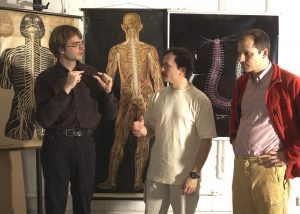4 July 2008
Sudden Infant Death Syndrome (SIDS) is a condition that unexpectedly and unexplainably takes the lives of seemingly healthy babies aged between a month and a year. Now researchers of the European Molecular Biology Laboratory in Monterotondo, Italy, have developed a mouse model of the so-called crib…
SCIENCE & TECHNOLOGY
2008
sciencescience-technology
21 October 2007
New insights into the cellular signal chain through which pheromones stimulate mating in yeast have been gained by scientists at the European Molecular Biology Laboratory [EMBL]. Similar signal chains are found in humans, where they are involved in many important processes such as the…
SCIENCE & TECHNOLOGY
2007
sciencescience-technology
20 April 2007

The rise of the central nervous system (CNS) in animal evolution has puzzled scientists for centuries. Vertebrates, insects and worms evolved from the same ancestor, but their CNSs are different and were thought to have evolved only after their lineages had split during evolution. Researchers from…
SCIENCE & TECHNOLOGY
2007
sciencescience-technology
8 January 2007
Phone numbers, the way to work, granny’s birthday – our brain with its finite number of nerve cells can store incredible amounts of information. At the bottom of memory lies a complex network of molecules. To understand how this network brings about one of the most remarkable capacities of…
SCIENCE & TECHNOLOGY
2007
sciencescience-technology
6 August 2006
Depression, coordination and speech problems, muscle weakness and disability are just a few of the symptoms of Multiple Sclerosis (MS). Researchers from the Mouse Biology Unit of the European Molecular Biology Laboratory (EMBL) in Italy and the Department of Neuropathology at the Faculty of…
SCIENCE & TECHNOLOGY
2006
sciencescience-technology
13 November 2005
Scientists at the Universities of Heidelberg and Ulm and a unit of the European Molecular Biology Laboratory (EMBL) in Monterotondo, Italy, have discovered that a specific signal within brain cells may determine whether they live or die after a stroke. Their study, published online (November 13) by…
SCIENCE & TECHNOLOGY
2005
sciencescience-technology
